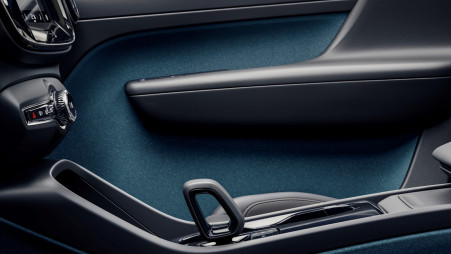How automakers upcycle waste into car parts
A brief look into the car industry's pursuit of sustainable materials
With the rising awareness of climate change, more and more sectors are looking into sustainability, the process of turning environmentally unfriendly materials into usable items.
The auto industry, being one of the major sources of greenhouse gas emissions, is no exception to this rule. From reclaimed wood to seat covers made from plastic bottles, the auto industry is working to turn otherwise landfill material into viable alternatives for other environmentally harmful resources.
Below are some ways the industry has succeeded in turning trash into treasure alongside a few they are actively pursuing.
Recycled plastic: From bottles to seats
Plastic waste, specifically polyethylene terephthalate (PET), is one of the biggest environmental hazards of modern times. Used to make single-use items such as shopping bags, soda bottles and straws, they are hard to dispose of and take an estimated 500 years to disintegrate (it still remains as micro or nano plastic).
National Geographic speculated that of the 8.3 billion metric ton of plastic humanity has created in the last six years, 6.3 billion metric ton have become plastic waste. Only nine per cent of which has been recycled. The vast majority—79 percent—is accumulating in landfills or sloughing off in the natural environment as littre.

The most common way carmakers recycle plastic is by turning them into interior upholstery. German automaker Audi is working on seats that are made with yarn produced from 89% ground up PET bottles. Conversely, American auto giant Ford already uses Repreve on some of their cars, which is a hybrid fibre made from recycled plastic water bottles and post-industrial waste.

Volvo, the Swedish automaker, has recently begun switching their leather trims to Nordico, a textile made from recycled PET bottles, bio-attributed material and corks recycled from wine bottles. While Volkswagen Group's Spanish offshoot, Cupra, has begun upcycling Mediterranean Sea plastic into the seat material for its Born electric hatchback.

In addition to the interior, recycled plastic is also used to make other car parts. BMW uses recycled plastic to make the door panels, seats, centre consoles and floors of their new iX electric SUV, which In total contains 132 pounds of recycled plastic.
Recycled Textile: From denim to sound insulation
According to the BBC, the world creates an estimated 92 million ton of textile waste every year. It is estimated that the modern fashion industry is responsible for 10% of all greenhouse gas emissions, with textile production amounting to 1.2 billion ton of greenhouse gases annually.
The concept of incorporating recycled clothes into car manufacturing is not new. During the cold war, East Germany made car bodies using Duroplast, a fibreglass-like material made using waste cotton. However, the cars were bare bones and hard to live with, and Duroplast ended up being too strong for their own good, being almost impervious to elements and hard to recycle.

In recent times, Japanese company Nissan has begun using recycled textile to make sound insulation for their Leaf electric vehicle. French company Renault has begun using seat material made from recycled safety belts, textile scraps and plastic bottles on their Zoe electric vehicle.
Andreas Vetter, BMW's project lead for exterior and interior design, mentioned in an interview with Forbes that for BMW cars "100% of the under-floor material is recycled insulation from old clothes." Similarly, Ford uses post-consumer recycled nylon to produce air cleaner housings, engine fans, fan shrouds and many other under-the-hood parts. In addition, the company uses nylon resin made from recycled carpets to make cylinder head covers.

Recycled agricultural waste: From coffee beans to headlights
According to the World Food Programme, humanity throws away about 1.3 billion ton of food per year. If wasted food were a country, it would be the third-largest producer of carbon dioxide in the world, after the USA and China.

One of the notable creators of food waste is the large food franchises. McDonalds for example produces around 30 thousand ton of coffee chaff — the husk of coffee beans that peels off during roasting — every year. However, instead of burning it, the company has entered a partnership with Ford Motor Company 2019, which used them to build high-temperature plastic items, such as headlight covers for their cars. Such parts are 20% lighter compared to normal plastic and take 25% less energy to build.

German sports car brand Porsche is another pioneer. The company has been manufacturing both the doors and the rear wing of their Porsche 718 Cayman GT4 Clubsport MR racing car using a mix of natural fibre made from flax, an agricultural byproduct. Additional prototype components, inducing but not limited to the front and rear apron, front spoiler lip, and front and rear lids, are currently undergoing testing on the race track.

In a similar fashion, Korean automaker Kia introduced a new type of bio-based organic plastics on their Soul EV. Derived from cellulose and sugarcane, the organic material is used to make 19 different interior parts including the door panels, headliner, seat trim, roof pillars, and carpets.
Spanish carmaker Seat announced in 2020 that they are also testing the concept of using rice husks as an alternative to plastic. Currently, the company is prototyping rice-based trim elements for their Leon model of hatchbacks.
Although not technically food waste, Mazda's MX-30 EV's centre console and door grips are made of cork, sourced from wine bottles and other beverages.
 Keep updated, follow The Business Standard's Google news channel
Keep updated, follow The Business Standard's Google news channel
















